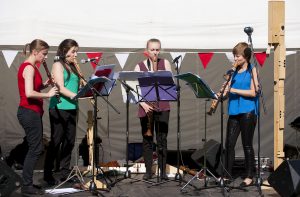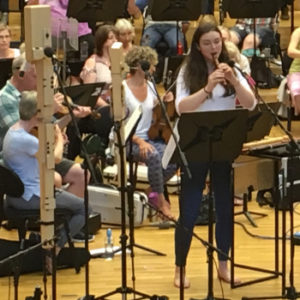Composers’ Competition 2020
The Composers’ Competition 2020 was organised by Steve Marshall with enormous help from Helen Hooker and Ann Marshall. The competition was to encourage the composition of music that would appeal to branches of the SRP, so the main requirement was that the music would be interesting, but not too difficult to play.
A large number of entries were received, and whittled down to six finalists, with the intention that the finals would take place at the 2020 SRP National Festival. With the cancellation of the 2020 and 2021 Festivals, an online poll was set up.
Helen kindly set up a website where she included videos, played by multi-tracked Helens, of the six finalist pieces. There was a poll so that people could vote for the piece they thought would have most appeal to SRP members. The winners can be seen on the website, at www.helenhooker.co.uk/composers-competition .
The Society of Recorder Players Composer’s Competition 2019
Click here for the results and recordings from the 2019 Composer’s Competition
The Society of Recorder Players is pleased to announce its first Composer’s Competition, an international competition adjudicated by Jonathan Dove. Four compositions will be short-listed in each category. BLOCK4 will prepare, then rehearse with the composer and perform the works in the final round at the National SRP Festival on 13 April 2019. Finalists will receive a high quality recording of BLOCK4’s performance of their work.
There are two categories:
– Open
– 18-&-under (on 31st August 2019)
Cash Prizes kindly donated by branches of the SRP:
– Open £600 – donated by Cambridge Branch
– 18-&-under £250 – donated by Suffolk Branch
– Audience prize £150 – donated by Lincolnshire Branch
Finalist Prize generously sponsored by the Durham & Newcastle Branches:
– All finalists will receive an HD recording of BLOCK4’s performance of their work.
We welcome entries from all over the world!
Works must be original compositions, not previously published, written for four recorder players and between three to six minutes in length.
Finalists – additional equipment such as electronics, must be provided, set up and engineered by the entrant or someone acting for them.
Entries will be anonymous. A candidate may submit more than one work, but each work must be submitted separately.
Please submit online:
– a score and parts in PDF file format under a pseudonym
– a soundfile under a pseudonym
– a completed application form and entry fee: £25 or £10 for those in full-time education.
Scores should be submitted by 12 noon on 15 December 2018. Finalists will be notified by 15 February 2019. Successful entrants are encouraged to attend the finals in person, and be available to work in an open rehearsal on their composition with BLOCK4, on 13 April 2019, prior to the competition in the afternoon. The entry form is available here.
Jeremy Thurlow, composer and Lecturer in Music at Cambridge University, will lead the panel of judges in the preliminary round. Jonathan Dove will adjudicate the Finals. The Judges’ decisions will be final.
The Society of Recorder Players retains the right to document, visually and acoustically, record and reproduce all concerts, performances and presentations held during the course of this competition.

The Society of Recorder Players are proud to have Jonathan Dove as their Honorary President and are delighted that he has agreed to be the lead judge for the inaugural finals of their new Composer’s Competition in April 2019.
He has used the recorder in several of his compositions, including: Light Dance, a piece for recorder octet, written in 2012 in response to a request from the Society of Recorder Players for a work to celebrate its 75th birthday. In the same year he also wrote The Pied Piper, a tour de force for clarinettist Emma Johnson which involves children playing simple recorder parts alongside professional musicians, plus optional additional parts for an advanced recorder group.

Formed in 2012, BLOCK4 is a London based recorder quartet featuring Royal College of Music alumni Emily Bannister, Lucy Carr, Katie Cowling and Rosie Land.
The quartet regularly perform contemporary music and work with emerging composers to create new repertoire. They were 2014 winners of the Royal Overseas League Ensemble competition – the first recorder consort to receive this accolade in the competition’s 65 year history – and were awarded first prize in 2016 at the Chesapeake Chamber Music Competition, USA. BLOCK4 are Live Music Now artists and were Ensemble in Residence for Handel & Hendrix House Museum 2015-2017, creating bespoke programmes based on the music of G.F. Handel and Jimi Hendrix.
Performances in the UK have included concerts at the National Gallery, Queen Elizabeth Hall, Wigmore Hall, St. Martin-in-the-Fields, Brighton Early Music Festival, and Greenwich International Early Music Festival. International appearances include the Styriarte Festival Graz, Amstelkerk, Amsterdam, and a concert series in Chesapeake, USA.

“I loved writing the Recorder Concerto for Sophie Westbrooke. It was not an instrument that I had detailed knowledge of at the outset, so it was a big learning curve and I discovered things which of course recorder players have known for centuries, that is it has a breadth of wonderful possibilities, a richness of tone, range and facility for speedy finger work and has been unfairly overlooked too often in the past. For me in that work it seemed important to acknowledge the directness of airflow that is involved. The performer blows directly down the tube without anything getting in the way – like a reed, or having to precisely angle an instrument, or having to blow a raspberry down it. The lack of air-flow resistance was refreshing and honest and massively versatile. So ‘breath’ became central to the work, and within the piece there are different breathing cycles – the anticipatory inhale, the unwinding exhale, the breath with exudes effort, the breathing which post-effort slowly normalises and the breathing of calmness. I loved working with the range of recorders and finding their own particular characters, because each one has its own. Having written for a quartet of recorders and arranged music for solo recorder, I find each time it’s a complete joy so I hope to write again for the instrument in the future.”
For examples of recent commissions for the SRP see www.srp.org.uk/commissioned-music/

